University Assignment: Therapeutic Relationship Video Paper, NURS 1207
VerifiedAdded on 2022/08/26
|11
|1645
|21
Report
AI Summary
This report analyzes a video monologue depicting a client's experience related to his father's Alzheimer's diagnosis and the impact on their relationship. The assignment fulfills several tasks: It identifies the value of listening in therapeutic relationships from both patient and nurse perspectives. It analyzes verbal and non-verbal cues in the video, identifying themes such as regret, communication issues, impact of interpersonal skills, mourning, and affection for family. The report clarifies the father's condition based on the monologue and proposes a social work referral along with educational materials for the family. The report emphasizes purposeful therapeutic intent, advocating for improved interpersonal relationships to enhance patient care, and aligns recommendations with best practice guidelines.
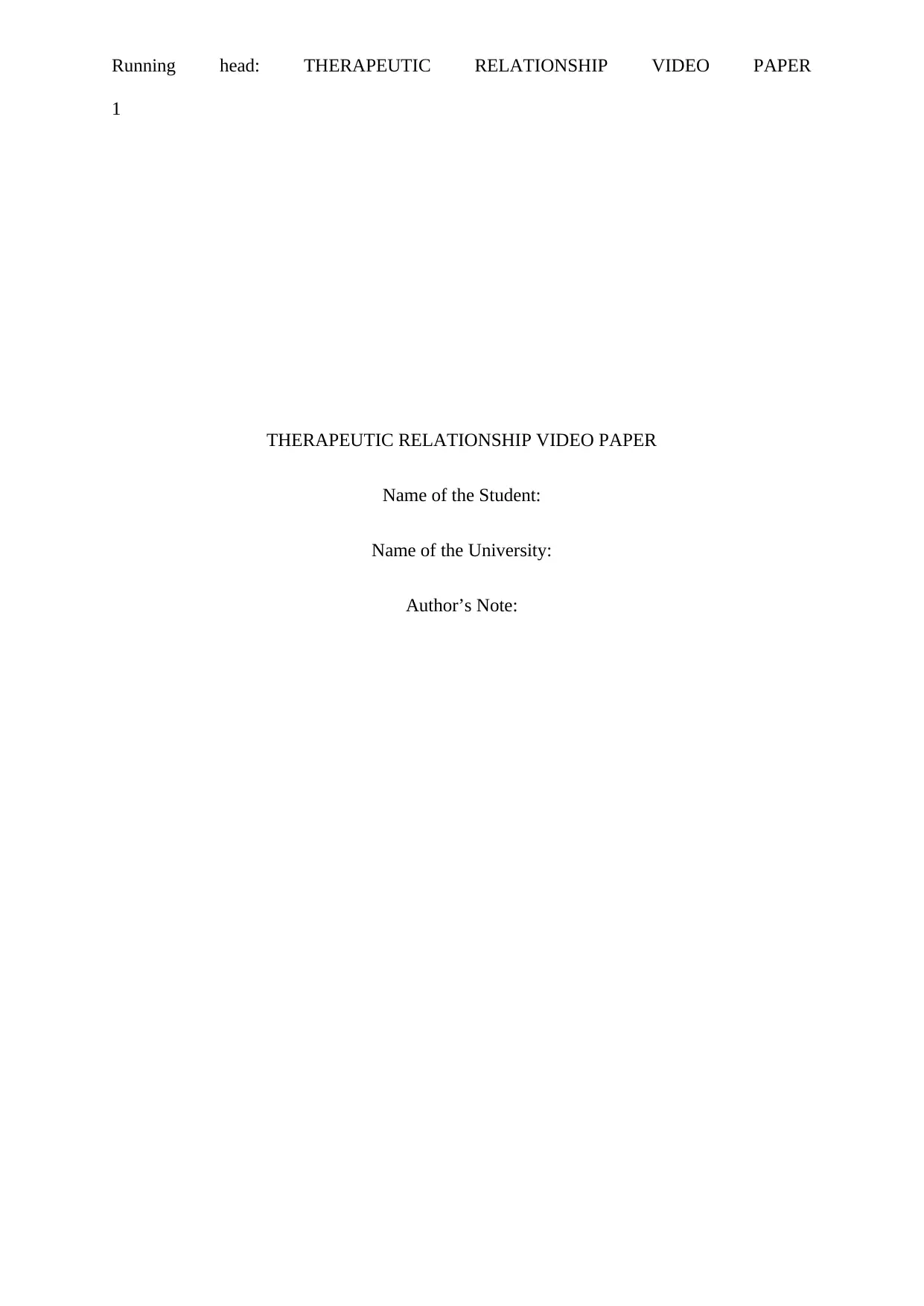
Running head: THERAPEUTIC RELATIONSHIP VIDEO PAPER
1
THERAPEUTIC RELATIONSHIP VIDEO PAPER
Name of the Student:
Name of the University:
Author’s Note:
1
THERAPEUTIC RELATIONSHIP VIDEO PAPER
Name of the Student:
Name of the University:
Author’s Note:
Paraphrase This Document
Need a fresh take? Get an instant paraphrase of this document with our AI Paraphraser
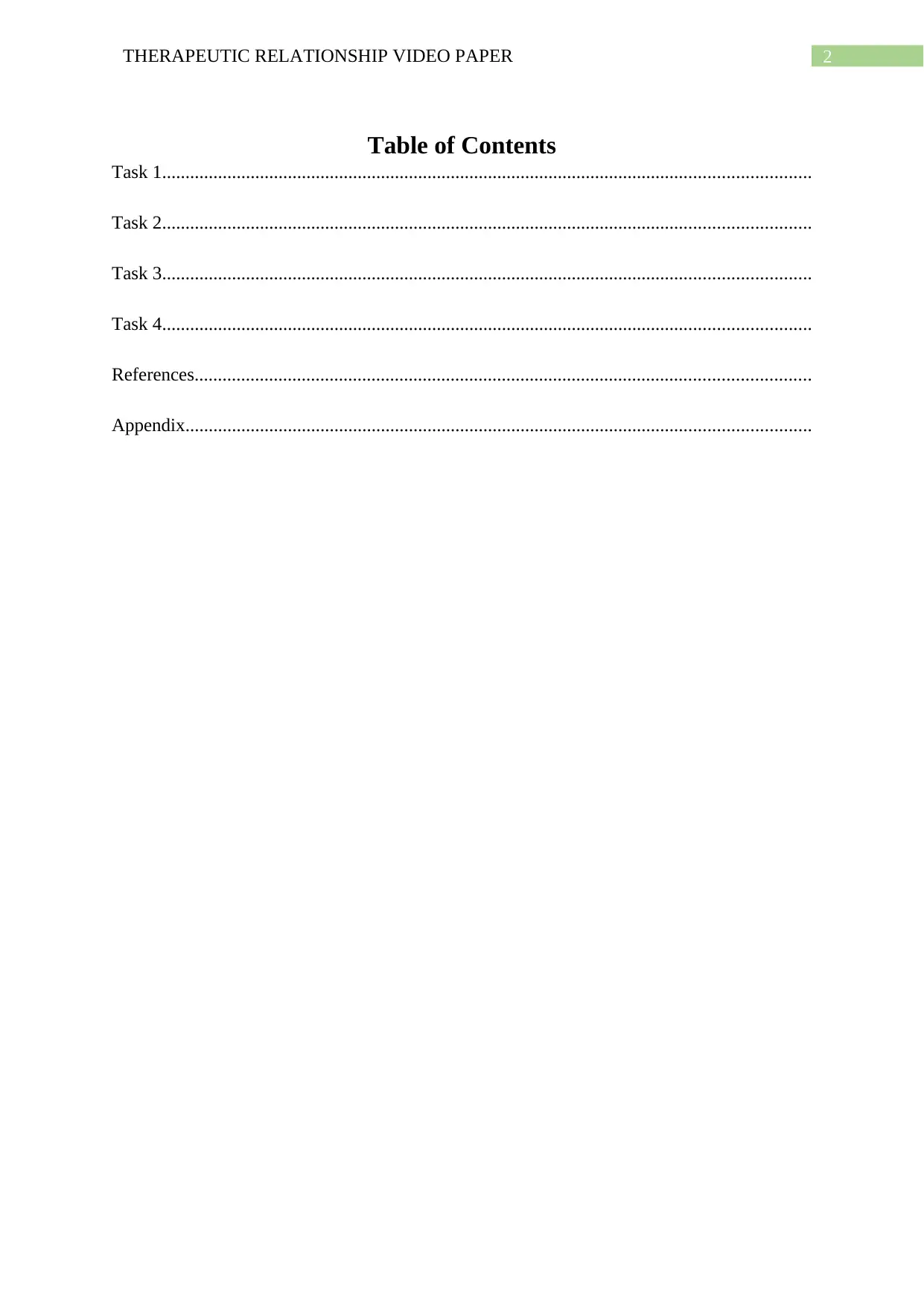
2THERAPEUTIC RELATIONSHIP VIDEO PAPER
Table of Contents
Task 1...........................................................................................................................................
Task 2...........................................................................................................................................
Task 3...........................................................................................................................................
Task 4...........................................................................................................................................
References....................................................................................................................................
Appendix......................................................................................................................................
Table of Contents
Task 1...........................................................................................................................................
Task 2...........................................................................................................................................
Task 3...........................................................................................................................................
Task 4...........................................................................................................................................
References....................................................................................................................................
Appendix......................................................................................................................................
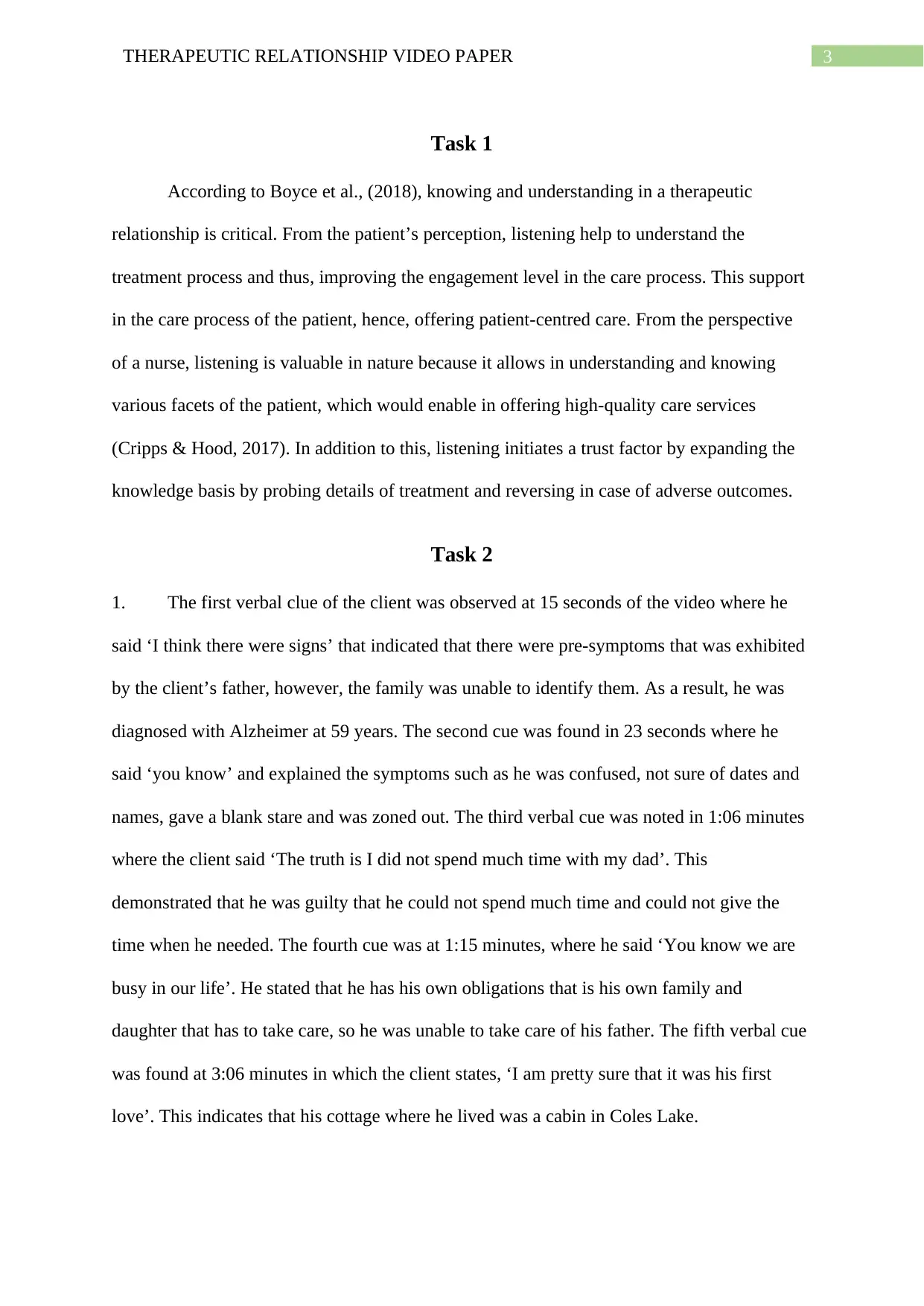
3THERAPEUTIC RELATIONSHIP VIDEO PAPER
Task 1
According to Boyce et al., (2018), knowing and understanding in a therapeutic
relationship is critical. From the patient’s perception, listening help to understand the
treatment process and thus, improving the engagement level in the care process. This support
in the care process of the patient, hence, offering patient-centred care. From the perspective
of a nurse, listening is valuable in nature because it allows in understanding and knowing
various facets of the patient, which would enable in offering high-quality care services
(Cripps & Hood, 2017). In addition to this, listening initiates a trust factor by expanding the
knowledge basis by probing details of treatment and reversing in case of adverse outcomes.
Task 2
1. The first verbal clue of the client was observed at 15 seconds of the video where he
said ‘I think there were signs’ that indicated that there were pre-symptoms that was exhibited
by the client’s father, however, the family was unable to identify them. As a result, he was
diagnosed with Alzheimer at 59 years. The second cue was found in 23 seconds where he
said ‘you know’ and explained the symptoms such as he was confused, not sure of dates and
names, gave a blank stare and was zoned out. The third verbal cue was noted in 1:06 minutes
where the client said ‘The truth is I did not spend much time with my dad’. This
demonstrated that he was guilty that he could not spend much time and could not give the
time when he needed. The fourth cue was at 1:15 minutes, where he said ‘You know we are
busy in our life’. He stated that he has his own obligations that is his own family and
daughter that has to take care, so he was unable to take care of his father. The fifth verbal cue
was found at 3:06 minutes in which the client states, ‘I am pretty sure that it was his first
love’. This indicates that his cottage where he lived was a cabin in Coles Lake.
Task 1
According to Boyce et al., (2018), knowing and understanding in a therapeutic
relationship is critical. From the patient’s perception, listening help to understand the
treatment process and thus, improving the engagement level in the care process. This support
in the care process of the patient, hence, offering patient-centred care. From the perspective
of a nurse, listening is valuable in nature because it allows in understanding and knowing
various facets of the patient, which would enable in offering high-quality care services
(Cripps & Hood, 2017). In addition to this, listening initiates a trust factor by expanding the
knowledge basis by probing details of treatment and reversing in case of adverse outcomes.
Task 2
1. The first verbal clue of the client was observed at 15 seconds of the video where he
said ‘I think there were signs’ that indicated that there were pre-symptoms that was exhibited
by the client’s father, however, the family was unable to identify them. As a result, he was
diagnosed with Alzheimer at 59 years. The second cue was found in 23 seconds where he
said ‘you know’ and explained the symptoms such as he was confused, not sure of dates and
names, gave a blank stare and was zoned out. The third verbal cue was noted in 1:06 minutes
where the client said ‘The truth is I did not spend much time with my dad’. This
demonstrated that he was guilty that he could not spend much time and could not give the
time when he needed. The fourth cue was at 1:15 minutes, where he said ‘You know we are
busy in our life’. He stated that he has his own obligations that is his own family and
daughter that has to take care, so he was unable to take care of his father. The fifth verbal cue
was found at 3:06 minutes in which the client states, ‘I am pretty sure that it was his first
love’. This indicates that his cottage where he lived was a cabin in Coles Lake.
⊘ This is a preview!⊘
Do you want full access?
Subscribe today to unlock all pages.

Trusted by 1+ million students worldwide
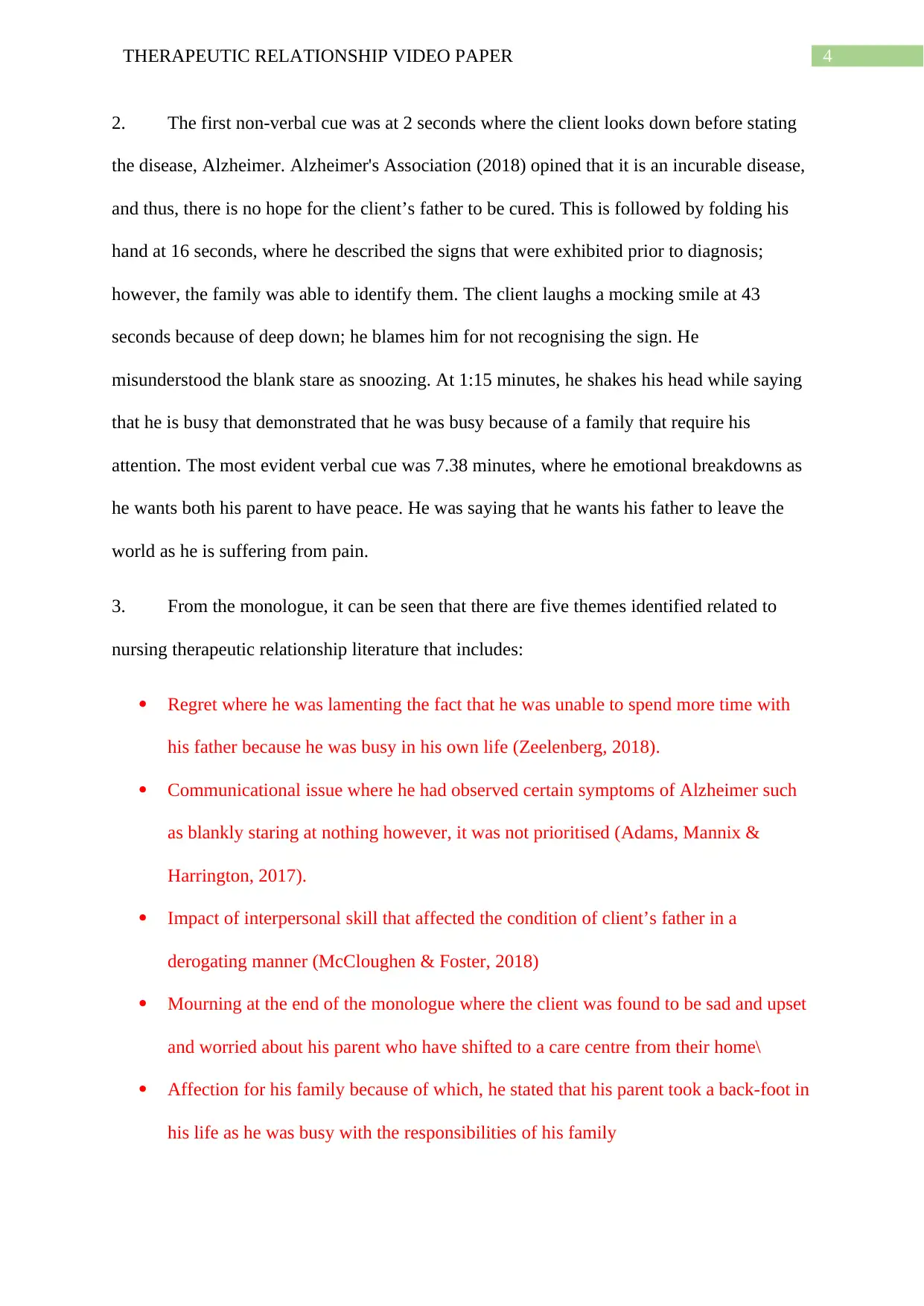
4THERAPEUTIC RELATIONSHIP VIDEO PAPER
2. The first non-verbal cue was at 2 seconds where the client looks down before stating
the disease, Alzheimer. Alzheimer's Association (2018) opined that it is an incurable disease,
and thus, there is no hope for the client’s father to be cured. This is followed by folding his
hand at 16 seconds, where he described the signs that were exhibited prior to diagnosis;
however, the family was able to identify them. The client laughs a mocking smile at 43
seconds because of deep down; he blames him for not recognising the sign. He
misunderstood the blank stare as snoozing. At 1:15 minutes, he shakes his head while saying
that he is busy that demonstrated that he was busy because of a family that require his
attention. The most evident verbal cue was 7.38 minutes, where he emotional breakdowns as
he wants both his parent to have peace. He was saying that he wants his father to leave the
world as he is suffering from pain.
3. From the monologue, it can be seen that there are five themes identified related to
nursing therapeutic relationship literature that includes:
Regret where he was lamenting the fact that he was unable to spend more time with
his father because he was busy in his own life (Zeelenberg, 2018).
Communicational issue where he had observed certain symptoms of Alzheimer such
as blankly staring at nothing however, it was not prioritised (Adams, Mannix &
Harrington, 2017).
Impact of interpersonal skill that affected the condition of client’s father in a
derogating manner (McCloughen & Foster, 2018)
Mourning at the end of the monologue where the client was found to be sad and upset
and worried about his parent who have shifted to a care centre from their home\
Affection for his family because of which, he stated that his parent took a back-foot in
his life as he was busy with the responsibilities of his family
2. The first non-verbal cue was at 2 seconds where the client looks down before stating
the disease, Alzheimer. Alzheimer's Association (2018) opined that it is an incurable disease,
and thus, there is no hope for the client’s father to be cured. This is followed by folding his
hand at 16 seconds, where he described the signs that were exhibited prior to diagnosis;
however, the family was able to identify them. The client laughs a mocking smile at 43
seconds because of deep down; he blames him for not recognising the sign. He
misunderstood the blank stare as snoozing. At 1:15 minutes, he shakes his head while saying
that he is busy that demonstrated that he was busy because of a family that require his
attention. The most evident verbal cue was 7.38 minutes, where he emotional breakdowns as
he wants both his parent to have peace. He was saying that he wants his father to leave the
world as he is suffering from pain.
3. From the monologue, it can be seen that there are five themes identified related to
nursing therapeutic relationship literature that includes:
Regret where he was lamenting the fact that he was unable to spend more time with
his father because he was busy in his own life (Zeelenberg, 2018).
Communicational issue where he had observed certain symptoms of Alzheimer such
as blankly staring at nothing however, it was not prioritised (Adams, Mannix &
Harrington, 2017).
Impact of interpersonal skill that affected the condition of client’s father in a
derogating manner (McCloughen & Foster, 2018)
Mourning at the end of the monologue where the client was found to be sad and upset
and worried about his parent who have shifted to a care centre from their home\
Affection for his family because of which, he stated that his parent took a back-foot in
his life as he was busy with the responsibilities of his family
Paraphrase This Document
Need a fresh take? Get an instant paraphrase of this document with our AI Paraphraser
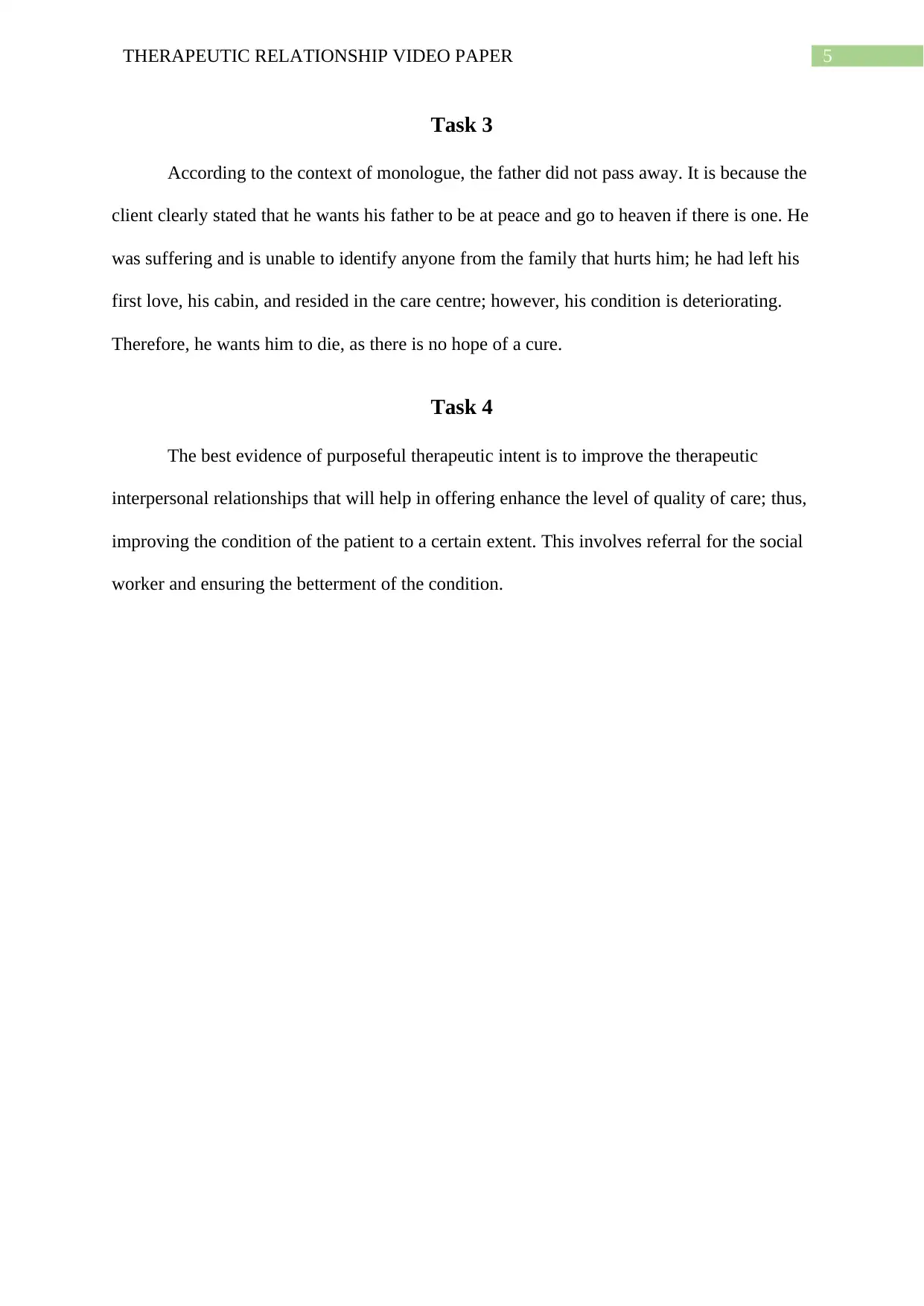
5THERAPEUTIC RELATIONSHIP VIDEO PAPER
Task 3
According to the context of monologue, the father did not pass away. It is because the
client clearly stated that he wants his father to be at peace and go to heaven if there is one. He
was suffering and is unable to identify anyone from the family that hurts him; he had left his
first love, his cabin, and resided in the care centre; however, his condition is deteriorating.
Therefore, he wants him to die, as there is no hope of a cure.
Task 4
The best evidence of purposeful therapeutic intent is to improve the therapeutic
interpersonal relationships that will help in offering enhance the level of quality of care; thus,
improving the condition of the patient to a certain extent. This involves referral for the social
worker and ensuring the betterment of the condition.
Task 3
According to the context of monologue, the father did not pass away. It is because the
client clearly stated that he wants his father to be at peace and go to heaven if there is one. He
was suffering and is unable to identify anyone from the family that hurts him; he had left his
first love, his cabin, and resided in the care centre; however, his condition is deteriorating.
Therefore, he wants him to die, as there is no hope of a cure.
Task 4
The best evidence of purposeful therapeutic intent is to improve the therapeutic
interpersonal relationships that will help in offering enhance the level of quality of care; thus,
improving the condition of the patient to a certain extent. This involves referral for the social
worker and ensuring the betterment of the condition.
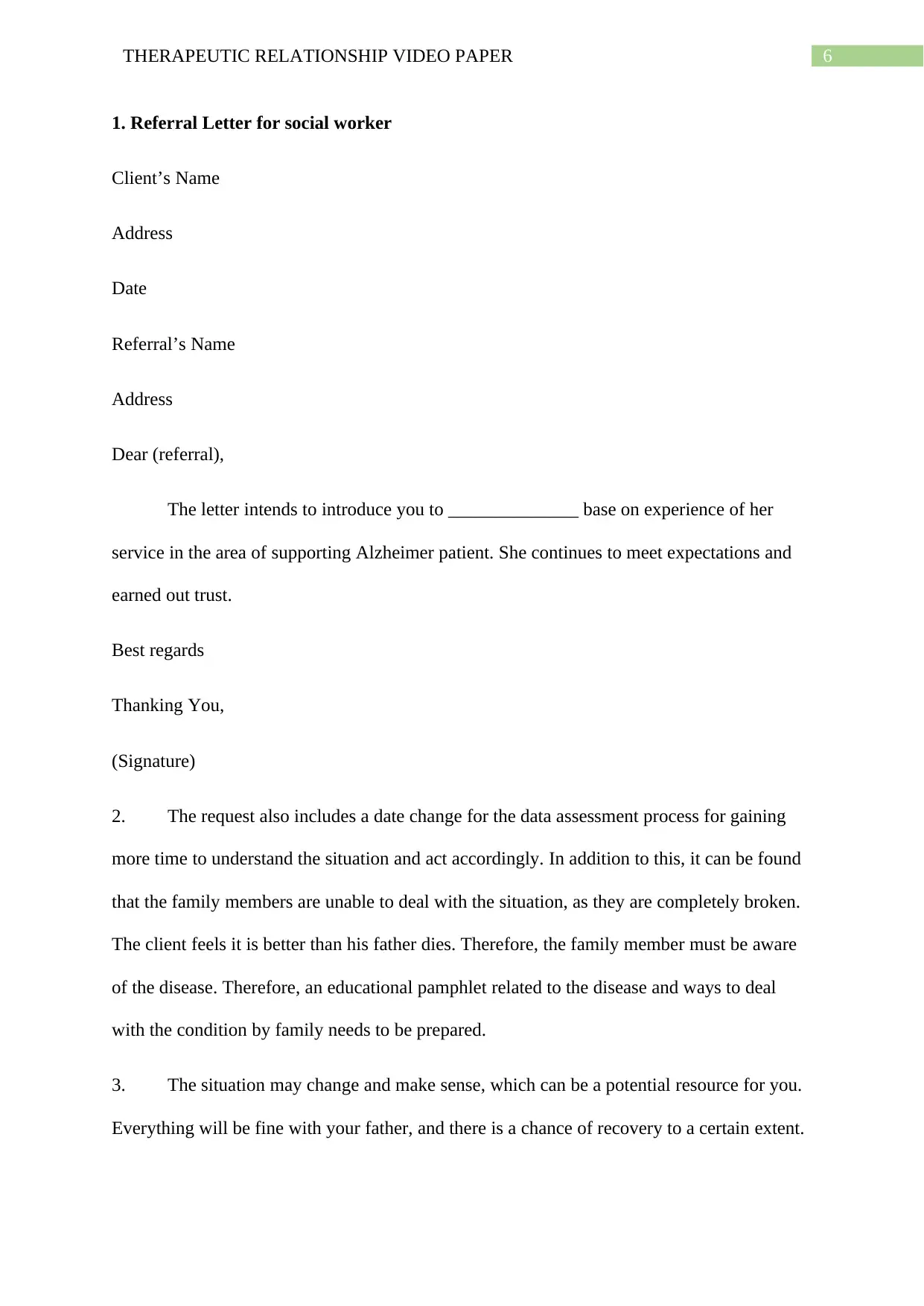
6THERAPEUTIC RELATIONSHIP VIDEO PAPER
1. Referral Letter for social worker
Client’s Name
Address
Date
Referral’s Name
Address
Dear (referral),
The letter intends to introduce you to ______________ base on experience of her
service in the area of supporting Alzheimer patient. She continues to meet expectations and
earned out trust.
Best regards
Thanking You,
(Signature)
2. The request also includes a date change for the data assessment process for gaining
more time to understand the situation and act accordingly. In addition to this, it can be found
that the family members are unable to deal with the situation, as they are completely broken.
The client feels it is better than his father dies. Therefore, the family member must be aware
of the disease. Therefore, an educational pamphlet related to the disease and ways to deal
with the condition by family needs to be prepared.
3. The situation may change and make sense, which can be a potential resource for you.
Everything will be fine with your father, and there is a chance of recovery to a certain extent.
1. Referral Letter for social worker
Client’s Name
Address
Date
Referral’s Name
Address
Dear (referral),
The letter intends to introduce you to ______________ base on experience of her
service in the area of supporting Alzheimer patient. She continues to meet expectations and
earned out trust.
Best regards
Thanking You,
(Signature)
2. The request also includes a date change for the data assessment process for gaining
more time to understand the situation and act accordingly. In addition to this, it can be found
that the family members are unable to deal with the situation, as they are completely broken.
The client feels it is better than his father dies. Therefore, the family member must be aware
of the disease. Therefore, an educational pamphlet related to the disease and ways to deal
with the condition by family needs to be prepared.
3. The situation may change and make sense, which can be a potential resource for you.
Everything will be fine with your father, and there is a chance of recovery to a certain extent.
⊘ This is a preview!⊘
Do you want full access?
Subscribe today to unlock all pages.

Trusted by 1+ million students worldwide
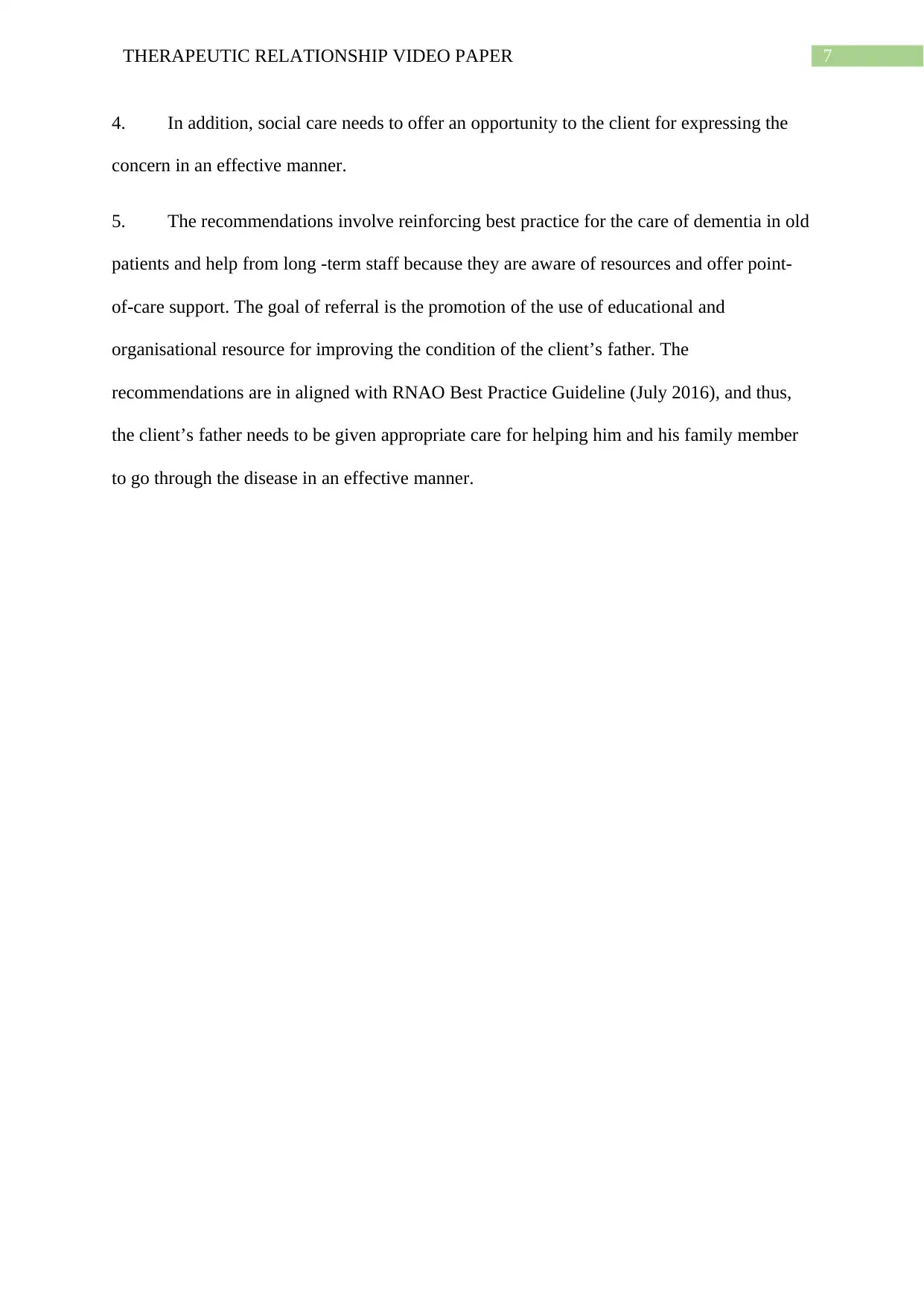
7THERAPEUTIC RELATIONSHIP VIDEO PAPER
4. In addition, social care needs to offer an opportunity to the client for expressing the
concern in an effective manner.
5. The recommendations involve reinforcing best practice for the care of dementia in old
patients and help from long -term staff because they are aware of resources and offer point-
of-care support. The goal of referral is the promotion of the use of educational and
organisational resource for improving the condition of the client’s father. The
recommendations are in aligned with RNAO Best Practice Guideline (July 2016), and thus,
the client’s father needs to be given appropriate care for helping him and his family member
to go through the disease in an effective manner.
4. In addition, social care needs to offer an opportunity to the client for expressing the
concern in an effective manner.
5. The recommendations involve reinforcing best practice for the care of dementia in old
patients and help from long -term staff because they are aware of resources and offer point-
of-care support. The goal of referral is the promotion of the use of educational and
organisational resource for improving the condition of the client’s father. The
recommendations are in aligned with RNAO Best Practice Guideline (July 2016), and thus,
the client’s father needs to be given appropriate care for helping him and his family member
to go through the disease in an effective manner.
Paraphrase This Document
Need a fresh take? Get an instant paraphrase of this document with our AI Paraphraser
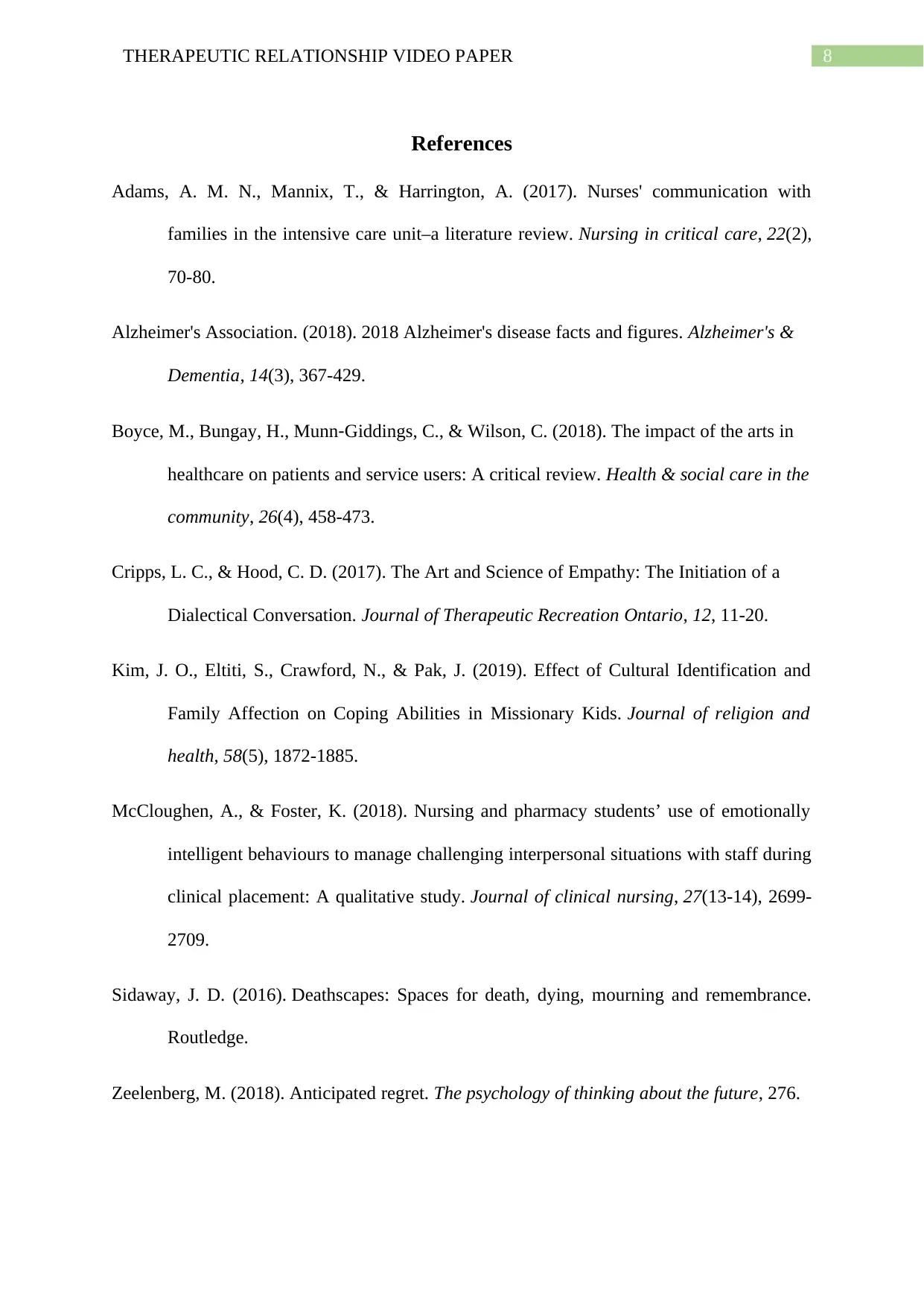
8THERAPEUTIC RELATIONSHIP VIDEO PAPER
References
Adams, A. M. N., Mannix, T., & Harrington, A. (2017). Nurses' communication with
families in the intensive care unit–a literature review. Nursing in critical care, 22(2),
70-80.
Alzheimer's Association. (2018). 2018 Alzheimer's disease facts and figures. Alzheimer's &
Dementia, 14(3), 367-429.
Boyce, M., Bungay, H., Munn‐Giddings, C., & Wilson, C. (2018). The impact of the arts in
healthcare on patients and service users: A critical review. Health & social care in the
community, 26(4), 458-473.
Cripps, L. C., & Hood, C. D. (2017). The Art and Science of Empathy: The Initiation of a
Dialectical Conversation. Journal of Therapeutic Recreation Ontario, 12, 11-20.
Kim, J. O., Eltiti, S., Crawford, N., & Pak, J. (2019). Effect of Cultural Identification and
Family Affection on Coping Abilities in Missionary Kids. Journal of religion and
health, 58(5), 1872-1885.
McCloughen, A., & Foster, K. (2018). Nursing and pharmacy students’ use of emotionally
intelligent behaviours to manage challenging interpersonal situations with staff during
clinical placement: A qualitative study. Journal of clinical nursing, 27(13-14), 2699-
2709.
Sidaway, J. D. (2016). Deathscapes: Spaces for death, dying, mourning and remembrance.
Routledge.
Zeelenberg, M. (2018). Anticipated regret. The psychology of thinking about the future, 276.
References
Adams, A. M. N., Mannix, T., & Harrington, A. (2017). Nurses' communication with
families in the intensive care unit–a literature review. Nursing in critical care, 22(2),
70-80.
Alzheimer's Association. (2018). 2018 Alzheimer's disease facts and figures. Alzheimer's &
Dementia, 14(3), 367-429.
Boyce, M., Bungay, H., Munn‐Giddings, C., & Wilson, C. (2018). The impact of the arts in
healthcare on patients and service users: A critical review. Health & social care in the
community, 26(4), 458-473.
Cripps, L. C., & Hood, C. D. (2017). The Art and Science of Empathy: The Initiation of a
Dialectical Conversation. Journal of Therapeutic Recreation Ontario, 12, 11-20.
Kim, J. O., Eltiti, S., Crawford, N., & Pak, J. (2019). Effect of Cultural Identification and
Family Affection on Coping Abilities in Missionary Kids. Journal of religion and
health, 58(5), 1872-1885.
McCloughen, A., & Foster, K. (2018). Nursing and pharmacy students’ use of emotionally
intelligent behaviours to manage challenging interpersonal situations with staff during
clinical placement: A qualitative study. Journal of clinical nursing, 27(13-14), 2699-
2709.
Sidaway, J. D. (2016). Deathscapes: Spaces for death, dying, mourning and remembrance.
Routledge.
Zeelenberg, M. (2018). Anticipated regret. The psychology of thinking about the future, 276.
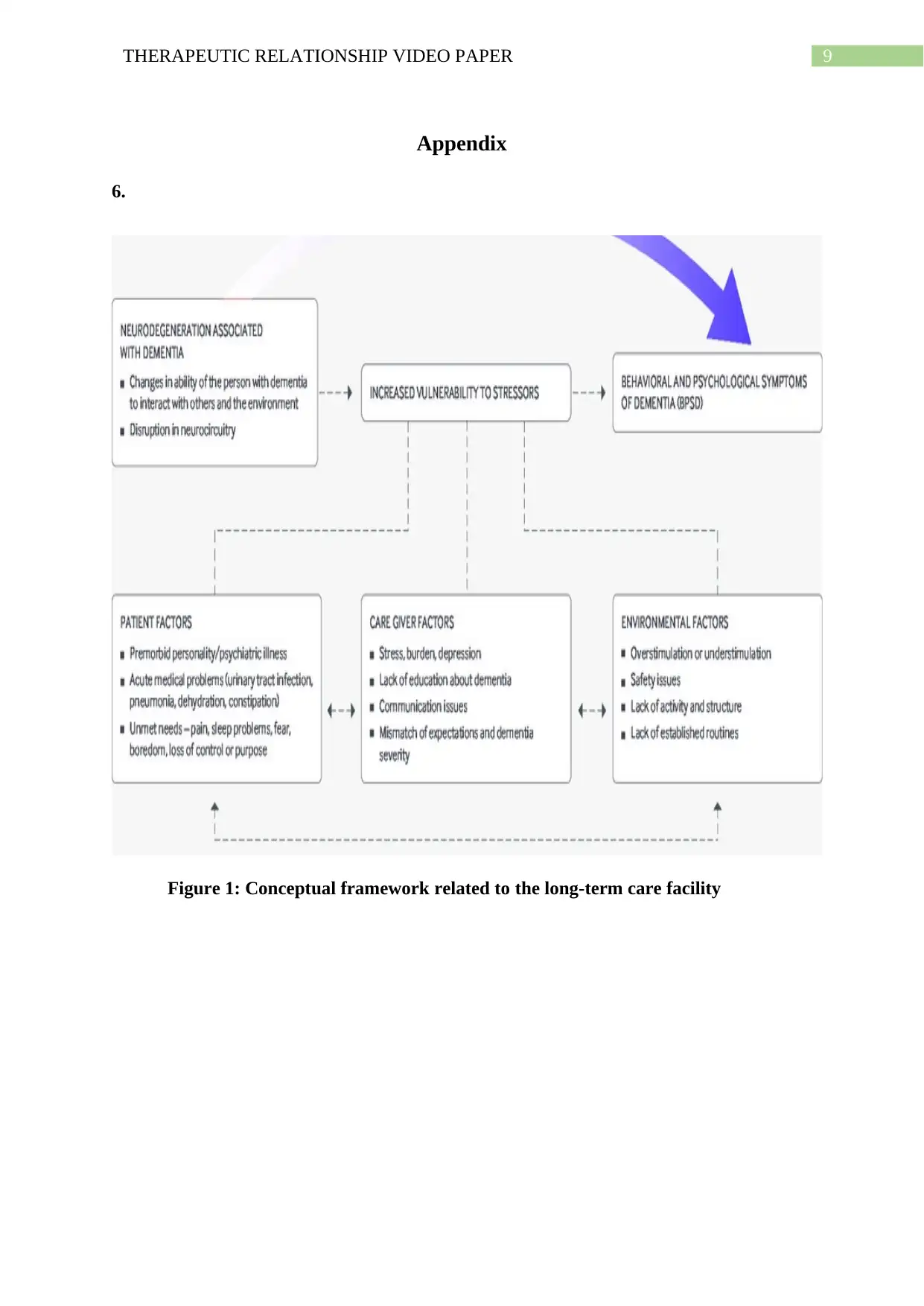
9THERAPEUTIC RELATIONSHIP VIDEO PAPER
Appendix
6.
Figure 1: Conceptual framework related to the long-term care facility
Appendix
6.
Figure 1: Conceptual framework related to the long-term care facility
⊘ This is a preview!⊘
Do you want full access?
Subscribe today to unlock all pages.

Trusted by 1+ million students worldwide
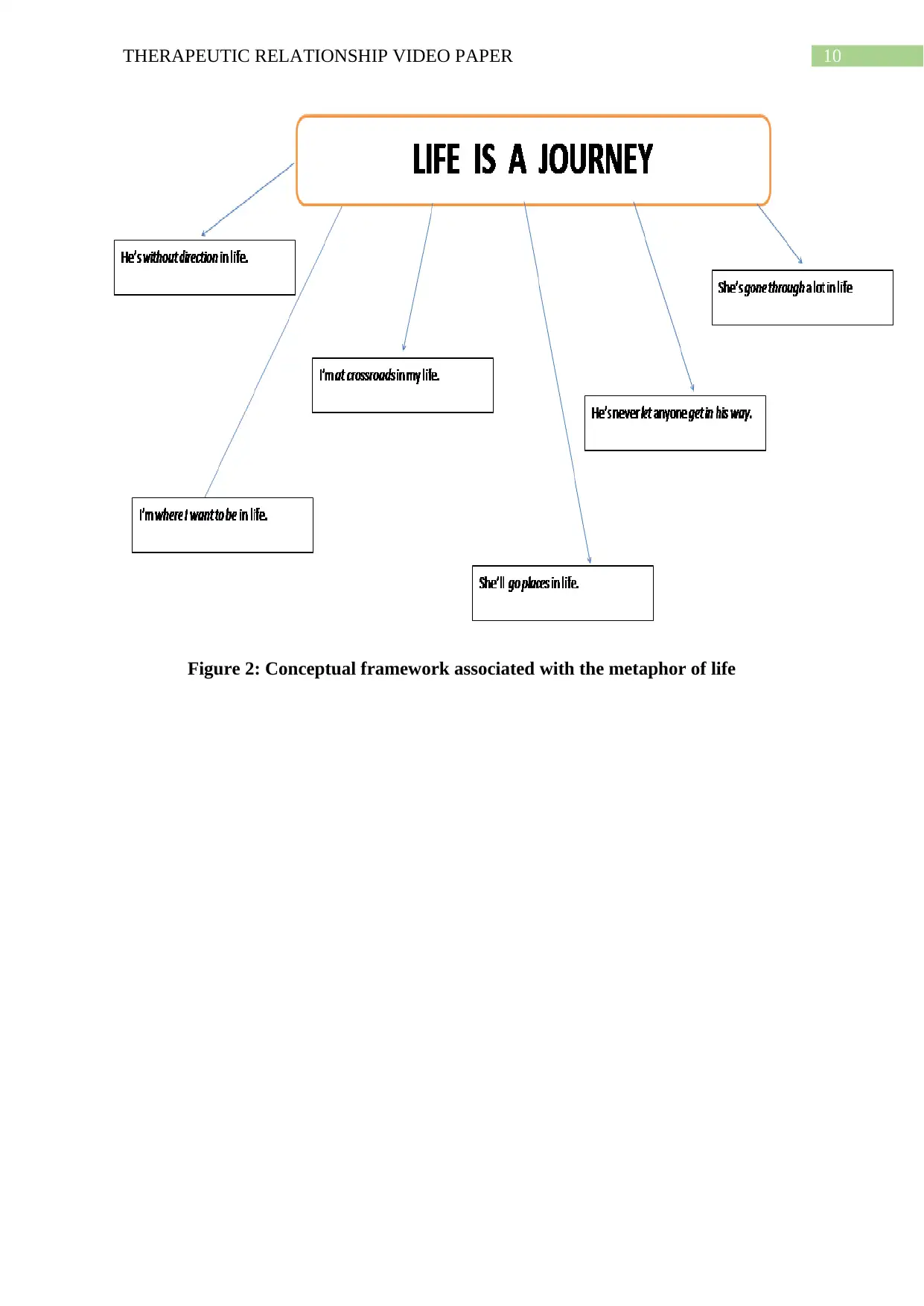
10THERAPEUTIC RELATIONSHIP VIDEO PAPER
Figure 2: Conceptual framework associated with the metaphor of life
Figure 2: Conceptual framework associated with the metaphor of life
Paraphrase This Document
Need a fresh take? Get an instant paraphrase of this document with our AI Paraphraser

11THERAPEUTIC RELATIONSHIP VIDEO PAPER
In this case, he is referred to as the client’s father, and she is the client’s mother.
In this case, he is referred to as the client’s father, and she is the client’s mother.
1 out of 11
Your All-in-One AI-Powered Toolkit for Academic Success.
+13062052269
info@desklib.com
Available 24*7 on WhatsApp / Email
![[object Object]](/_next/static/media/star-bottom.7253800d.svg)
Unlock your academic potential
Copyright © 2020–2025 A2Z Services. All Rights Reserved. Developed and managed by ZUCOL.


